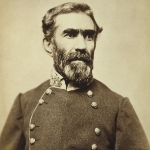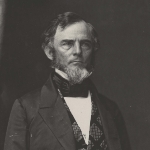Background
John Porter McCown was born on August 19, 1815, in Sevierville, Tennessee, United States. He was the son of George Wesly McCown and Mary Caroline Porter McCown.

West Point, NY, United States
John graduated tenth in a class of forty-two from the United States Military Academy in 1840 and entered the Artillery Corps.
John Porter McCown was born on August 19, 1815, in Sevierville, Tennessee, United States. He was the son of George Wesly McCown and Mary Caroline Porter McCown.
John graduated tenth in a class of forty-two from the United States Military Academy in 1840 and entered the Artillery Corps.
After assisting in the removal of Indians to the west in 1840, John McCown served on the frontier during the Canada border disturbances of 1840-1841.
In 1845-1846, he was part of the military occupation of Texas, and during the Mexican War, he was breveted captain for his gallantry at Cerro Gordo. Following frontier duty on the Rio Grande, he was promoted to captain in the 4th United States Artillery in January 1851. McCown also fought the Seminoles of Florida in 1856-1857, participated in the Utah expedition of 1858, and served at garrisons in Nebraska and the Dakotas from 1858 to 1861.
He resigned his commission on May 17, 1861, and entered the Confederate Army as a lieutenant colonel of artillery. Promoted to brigadier general on October 12, 1861, he contributed to the victory at Belmont, Missouri, on November 7 of that year. On March 10, 1862, he was promoted to major general, around the same time that he was blamed by General Braxton Bragg for the loss of New Madrid, Missouri.
After fighting at Fort Pillow in April through June 1862, McCown was given temporary command of the Army of the West. During Bragg's Kentucky campaign, he commanded the 3rd Division, and following the Confederate defeat at the battle of Murfreesboro, Bragg preferred charges against him for incompetence. McCown was found guilty by court-martial, and in 1863, he was sent to Mississippi where he spent the remainder of the war in obscurity.
McCown, who was himself hot-tempered, never forgave Bragg, whose animosity toward him was personal as well as professional. During the last days of the war, he successfully defended a crossing of the Catawba River near Morgantown, North Carolina. He surrendered in North Carolina and was soon paroled.
Shortly after the end of the war, he moved to Knoxville, Tennessee, where he obtained work as a school teacher. After traveling to Arkansas to visit with his brother George in 1868 at his home in Magnolia, McCown purchased a house in the southeastern section of the town, moving there soon afterward. He quickly became a respected citizen known for his farming and generosity.
John Porter McCown is known for his participation in the Mexican and Seminole wars before resigning from the United States Army.
McCown joined the Confederate army, rising to the rank of major general. He served in Missouri and Tennessee, leading a division that included an Arkansas brigade at Stones River.
McCown was himself hot-tempered.

McCown ran afoul of Braxton Bragg, who blamed McCown for the loss of New Madrid and labeled him "his worst division commander."

McCown was in charge of a Confederate infantry brigade under the command of Gideon J. Pillow.
